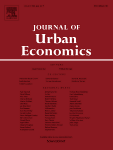
"The birth of edge cities in China: Measuring the effects of industrial parks policy", with Siqi Zheng, Weizeng Sun, and Matthew Kahn. Journal of Urban Economics 100, 2017,pp.80-103.
The birth of edge cities in China:
Measuring the effects of industrial parks policy
Siqi Zheng
Center for Real Estate, and Department of Urban Studies
and Planning, Massachusetts Institute of Technology, USA
Weizeng Sun
Institute for Economic and Social Research, Jinan
University, China
Jianfeng Wu
School of Economics and China Center for Economic Studies
(CCES), Fudan University, China
Matthew E. Kahn
Department of Economics, USC and NBER, USA
Abstract
China's government has spent hundreds of
billions of dollars to invest in new industrial parks with the intent of
boosting the economic growth, by attracting new firms into the parks and also
generating spillovers for the local economy. Do such place-based investments in
capital raise urban productivity or is this another case of the powerful state
misallocating capital in China? This paper measures the localized spillover
effects of 110 parks built in eight major cities on firm productivity, wages,
and local manufacturing employment growth. We find that the geographic
spillover effect of parks is an increasing function of the park's overall human
capital level, the FDI share, and its “synergy” with nearby incumbent firms
(measured by Marshallian factors). Using geo-coded data, we document that the
growth in local employment and wages stimulates nearby local housing
construction and retail store openings. The rise of a new production sub-center
causes the emergence of a suburban “consumer city”.
摘要
在过去30多年里,中国各级政府投资了数百亿资金新建各类型的开发区,以此吸引企业和通过产业集聚来促进本地经济增长。如此大规模的资本投资是否能够带来生产率水平的提高,还是造成资本的错配呢?本文考察了中国8个主要城市的110个国家级和省级开发区对制造业企业生产率水平、工资和本地制造业就业增长的溢出效应。文章发现开发区的人力资本水平、FDI比例和马歇尔外部性对其溢出效应有正向作用。利用地理编码信息,文章还发现本地就业和工资增长能够促进周边消费设施的发展,如住房建设和零售店面开张等。文章的研究证实了生产活动在城市次中心集聚会带来消费次中心的出现,从而形成“边缘城市”。
